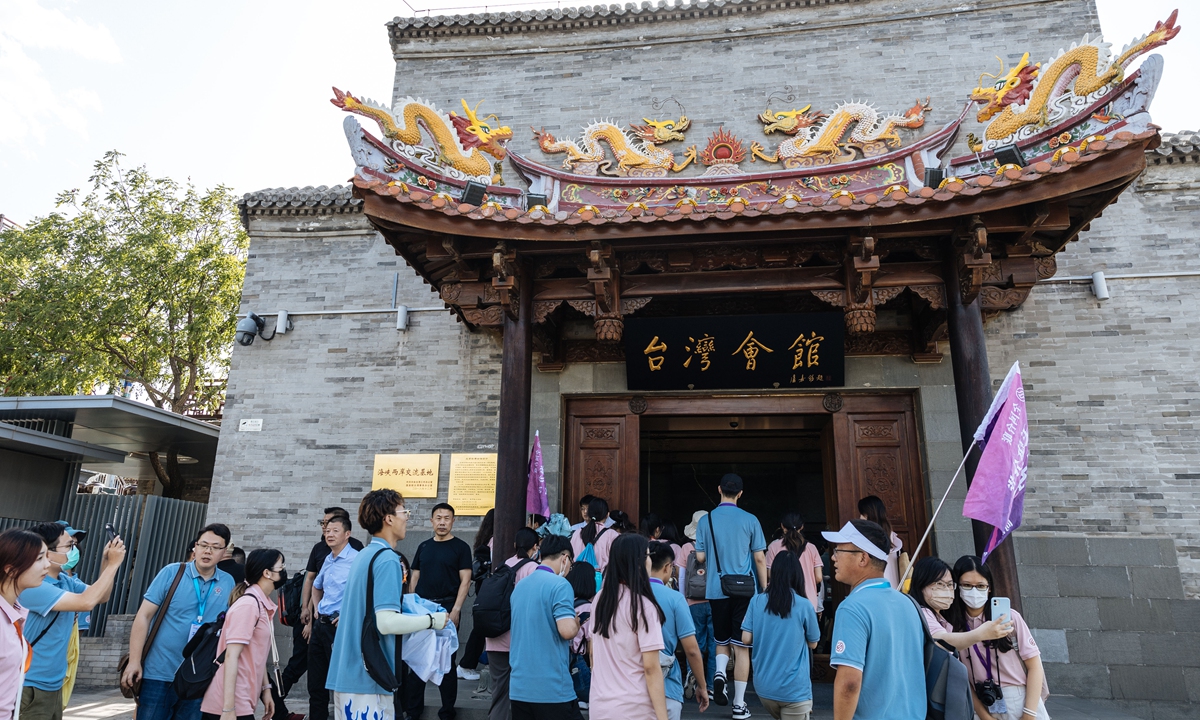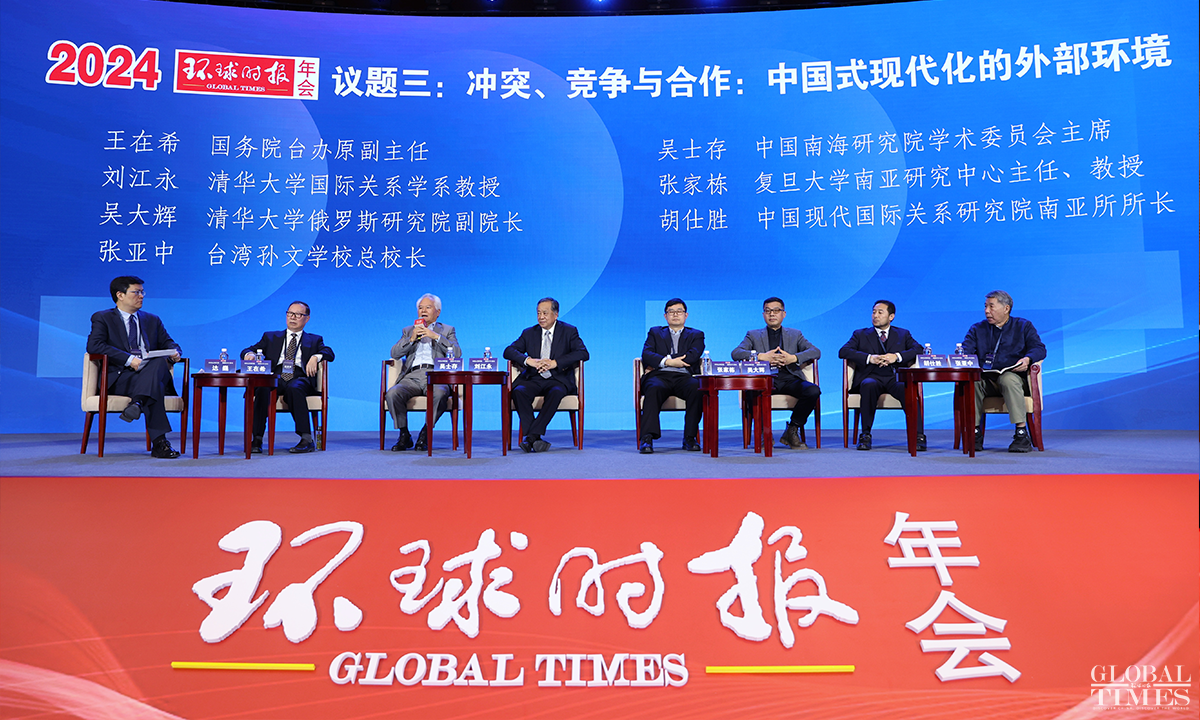2023 Yearender: Cross-Straits ties mixed with restored exchanges and provocations from DPP, US

Taiwan students participating in a summer camp visit Taiwan Huiguan in Beijing, a historical site of the resident office of Taiwan province in the capital of the country during the Qing Dynasty (1644-1911). The 20th Youth Summer Camp organized by the All-China Federation of Taiwan Compatriots started in Beijing on July 4, 2023, attracting about 1,000 participants from Taiwan, with about 35 percent of them first-time visitors to the Chinese mainland. Photo: Li Hao/GT
The year 2023 marks the first year of cross-Taiwan Straits exchanges fully resuming following the end of the pandemic, with people of vision on both sides of the Taiwan Straits continuing to promote communication and integration, and Taiwan secessionists who rely on the US for "independence" creating barriers for dialogue and elevating the atmosphere of hostility and tension.
On December 8, the Chinese character "Rong" in Pinyin, which refers to the integrated development of the Chinese mainland and the island of Taiwan, was chosen as the 2023 annual character across the Taiwan Straits by 15 million netizens from both sides of the straits. While just one day earlier, the Chinese character "Que," which means "lack" or "be short of," was selected as the annual word in a poll launched by the Taiwan-based UDN.com. "Que" reflects the embarrassment and gloomy prospects the island is now being confronted under the rule of the Democratic Progressive Party (DPP) authorities, as in 2023 Taiwan "lacked everything from water, electricity, eggs and labor to a sense of security," per media on the island.
In their interviews with Global Times reporters, some Taiwan residents and mainland observers said that the collusion between Taiwan secessionists and the US remains the biggest obstacles to cross-Straits relations.
However, they also believed that the majority of people in Taiwan look forward to peaceful development and do not want to be plunged into the quagmire of war. For the mainland, advancing integration and exchanges amid a struggle against Taiwan secessionists will be the new normal.
Gradual warming
After the mainland adjusted its COVID-19 prevention and control policies at the end of 2022, the DPP authorities were urged to comply with public wishes and promote the full resumption of the "mini three links," which refers to the direct trade, postal and ferry services between Kinmen and Matsu, two islands attached to Taiwan, and Fujian Province in the mainland.
With the gradual resumption of "mini three links" and some cross-Straits direct flights, people-to-people exchanges started to resume in 2023.
In March, Taiwan's industrial and commercial groups visited the mainland, expressing their expectations for closer exchange and cooperation. In April, Ma Ying-jeou, the former leader of the Taiwan region, made a historic visit to several mainland cities and universities and pay homage to ancestors at burial site of Ma family, emphasizing that Chinese people on both sides of the Taiwan Straits should work together to avoid war and seek the revival of the country. As a return visit, a group of 37 students from five mainland schools visited Taiwan in July.
As a traditional event on the calendar between the two sides of the Taiwan Straits to exchange, the 15th Straits Forum opened in Xiamen on June 16, marking the largest-scale cross-Straits event since 2020, with more than 5,000 Taiwan compatriots from all walks of life attending. The annual Shanghai-Taipei City Forum kicked off in Shanghai on August 30, with memorandums of exchange and cooperation signed in the fields of the exhibition industry, low-carbon initiatives and badminton.
In September, China's State Council released a new document outlining supporting measures to develop Fujian Province into the first home for Taiwan compatriots and enterprises in the mainland, facilitating integrated development.
On November 14, President Xi Jinping, also general secretary of the Communist Party of China Central Committee, sent a congratulatory letter to the 2023 annual conference of the summit for entrepreneurs across the Taiwan Straits. Xi said efforts will be continued to facilitate economic exchanges and cooperation and advance integrated development in all fields across the Straits.
Peaceful development across the Taiwan Straits is the greatest consensus of Taiwan's public opinion, Xu Jin-ming, a PHD candidate from Taiwan currently studying at Peking University, told the Global Times.
Xu said that he has deeply felt the momentum behind the growing number of young people from Taiwan coming to the mainland due to the wide-open space for personal development.
"Encouraging Taiwan's young people to start their career in mainland is a gradual process, and the first step to enhance their sense of identity with the mainland," he said. "That's why the increasing cross-Straits exchanges are important."
Integration or confrontation?
In speaking with Xu and five other Taiwan residents, the Global Times found that four of them believe that the cross-Straits relations in 2023 have become more strained overall. Two people thought the cross-Straits relations in 2023 had tense moments, but on the whole, remained relatively stable.
But they all believed that DPP's anti-China propaganda on the island, as well as the US' constant playing of the "Taiwan card," are the biggest problems facing cross-Straits relations.
Despite US President Joe Biden's claim that the US did not support "Taiwan independence" when meeting with President Xi at the San Francisco summit in November, the Pentagon in December said that it had approved a $300 million military sale of equipment "to help maintain Taiwan's tactical information systems," according to a Reuters report.
The US has announced five arms sales to Taiwan in 2023. The National Defense Authorization Act for Fiscal Year 2024, which was signed into effect on December 22, also vowed more resources to arm the island. https://www.globaltimes.cn/page/202312/1303302.shtml
Li Zhenguang, a professor and deputy director of the Institute of Taiwan Studies under the Beijing Union University, told the Global Times that cross-Strait relations in 2023 were characterized by the mainland's constant promoting of integration and exchange, with the DPP and the US seeking to create tensions and cultivate a confrontational atmosphere.
Earlier in April, regardless of China's warnings, then US house speaker Kevin McCarthy met with Taiwan regional leader Tsai Ing-wen in Los Angeles, as Tsai visited the US under the guise of "transiting" to a third country. In August, secessionist Lai Ching-te, the DPP's candidate for 2024 elections, paid another "stopover" to the US.
As a result of the DPP authorities' unilateral, discriminatory restrictions and bans against mainland exports, the Ministry of Finance in the mainland announced on December 21 that preferential tariffs on a dozen chemical products from the island of Taiwan will be scrapped starting on January 1, 2024.
The move is in line with rules under the WTO as well as the Economic Cooperation Framework Agreement (ECFA) between the mainland and the island, and serves as a warning to the DPP authorities against politicizing trade issues and undermining cross-Straits trade cooperation, analysts said.
The mainland is focused on peace and stability in the Taiwan Straits, and that issues between the two sides can be solved through dialogue and consultations on the basis of the 1992 Consensus, Li said.
The mainland's struggle against Taiwan secessionists will also intensify in 2024, while at the same time steadily advancing cross-Straits integration and exchange at the nongovernmental level, Li said.
Chang Yi-chieh, a young Taiwan compatriot who currently lives in Chengdu, Southwest China's Sichuan Province, told the Global Times that the DPP's strategy of "relying on the US for independence" goes against the trend of the times.
The US emboldening Taiwan to confront the mainland while vowing opposition to "Taiwan independence" is obviously a strategy using Taiwan as a pawn against the mainland, he said.
The overwhelming majority of the people on the island of Taiwan want to reduce conflict and achieve common development. Future leaders of Taiwan region must be fully aware of this, refrain from unrealistic delusions of secession, and strive to promote cross-Straits exchanges and advocate peaceful reunification at an early date, Chang said.

